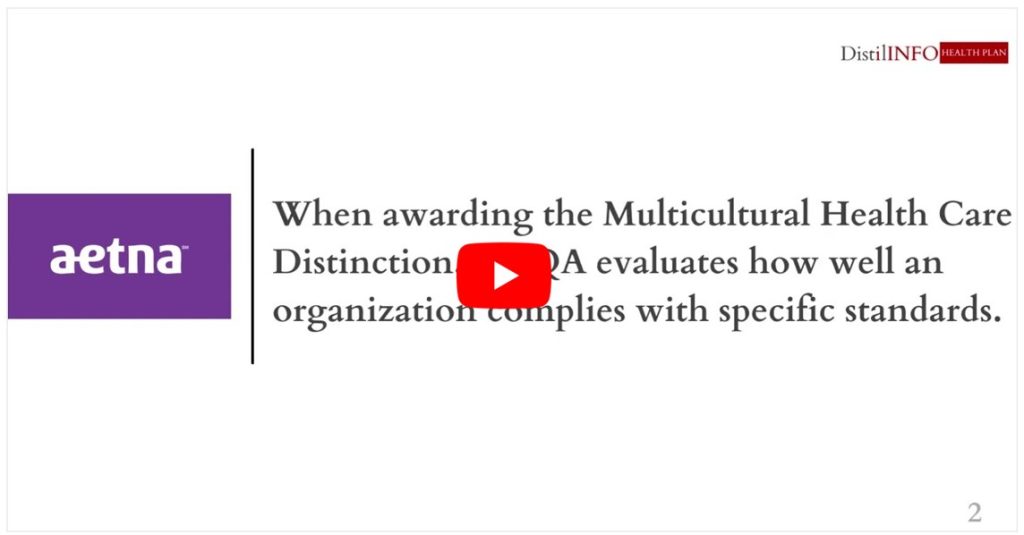
Aetna Better Health of California, a CVS Health company, announced today that it has been awarded the NCQA Multicultural Health Care Distinction. The Multicultural Health Care Distinction honors organizations that are market leaders in providing culturally and linguistically sensitive services while also working to reduce health care disparities. Health Equity Accreditation Plus expands on NCQA’s recently launched Health Equity Accreditation program, which established a strong foundation for improving health equity by assisting organizations in identifying and closing care gaps. Health Equity Accreditation Plus extends these activities for organizations with more advanced health equity procedures and data collection. NCQA believes that improving health equity necessitates engagement and collaboration throughout the health care industry, as well as with industry stakeholders such as employers, regulators, and community-based organizations. “Medicaid members whose first language is not English and who have low health literacy are at higher risk for health system navigation challenges,” said Verne Brizendine, CEO of Aetna Better Health of California.
Aetna’s Medicaid plan in California, Aetna Better Health of California, has received the National Committee for Quality Assurance’s (NCQA) Multicultural Health Care Distinction, highlighting the payer’s efforts to provide culturally sensitive services, reduce health disparities, and advance health equity.
When awarding the Multicultural Health Care Distinction, NCQA evaluates how well an organization complies with specific standards.

The committee focuses on an organization’s ability to collect race, ethnicity, and language data; provide language assistance; and meet cultural responsiveness standards. The program also evaluates how well an organization meets quality improvement standards for culturally linguistic appropriate services (CLAS).
“Medicaid members whose first language is not English and who have low health literacy are at higher risk for health system navigation challenges,” Verne Brizendine, chief executive officer of Aetna Better Health of California, said in the press release.
“Reducing health disparities begins with supporting the communications needs of diverse multicultural members and effectively utilizing health data to better serve them. We’re focused on advancing health equity in California, and we’re pleased that NCQA has recognized our efforts.”
The payer has helped boost access to care by creating an equitable experience from the moment beneficiaries enroll in the health plan. Individuals can learn how to access and navigate the Aetna website and member portal through New Member Welcome Classes.
The classes also offer information on how to set communication preferences, contact information, language, sexual orientation, gender identity, race/ethnicity, and preferred pronouns.
Additionally, the payer offers interpretation services for beneficiaries who speak any of California’s threshold languages—specific common languages in a given area.
The health plan’s efforts have yielded positive results, according to the press release. In 2019, the plan’s Healthcare Effectiveness Data and Information Set (HEDIS) measure for Adults’ Access to Preventive/Ambulatory Health Services rose by 38.4 percent for Asian/Pacific Islander members and 23.6 percent for Hispanic members.
Aetna Better Health of California has also focused on improving health equity during the COVID-19 pandemic.

The plan participated in a COVID-19 vaccine incentive campaign with the state of California in September 2021. The campaign provided rewards cards and outreach to plan members from a team trained in vaccine hesitancy. In addition, the payer analyzed population health data to determine focus areas based on vaccination status.
The COVID-19 vaccination rate among Aetna’s Medicaid beneficiaries in Sacramento and San Diego counties increased by 14 percent overall as of January 2022.
Notably, the vaccination rate improved by 26 percent among Black beneficiaries. This population is a critical focus area as the pandemic disproportionately affected communities of color. The vaccination rate also increased by 18 percent among individuals aged 12 to 25.
Aetna and its parent company, CVS Health, have worked to address health equity across all their health plans in recent years.
For example, Mercy Care, a Medicaid-managed care plan administered by Aetna, partnered with a crisis intervention team in Arizona. The team trains police officers to deescalate situations involving people experiencing a behavioral health crisis.
CVS Health has also invested in affordable housing initiatives to address social determinants of health and racial health disparities.
The payer recently expanded its community-based screening program, Project Health, into Las Vegas, Nevada and Richmond, Virginia. Project Health offers access to preventive care screenings to people with or without insurance coverage.
Source: HealthPayer Intelligence

